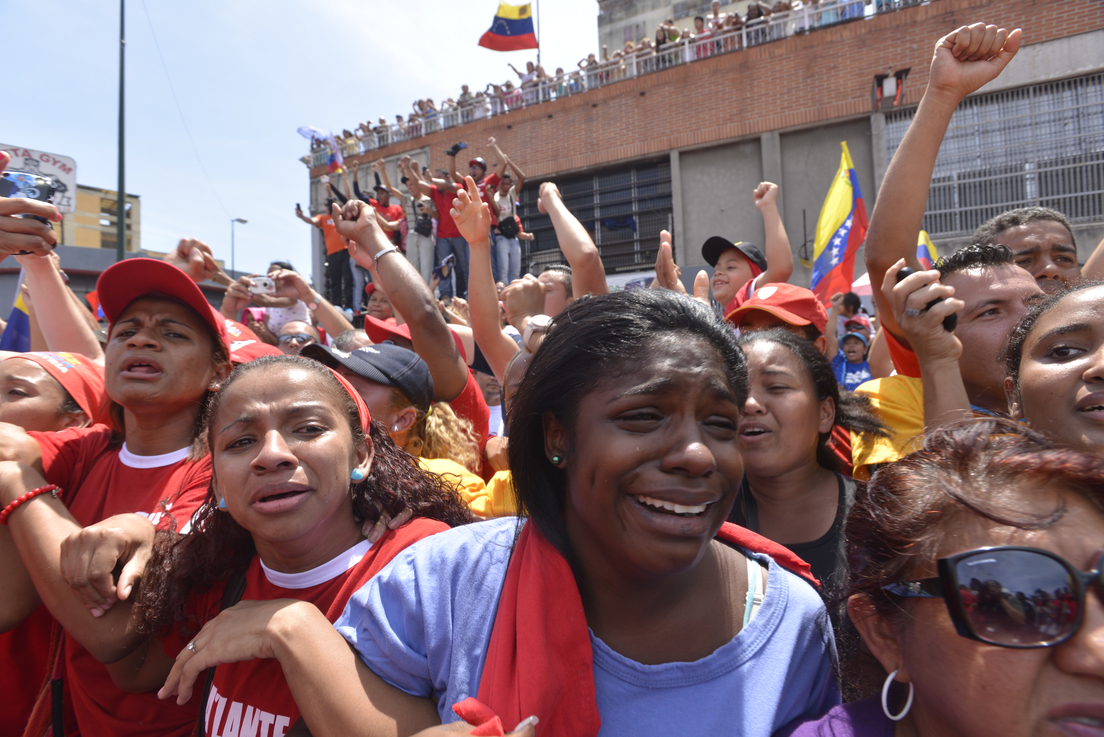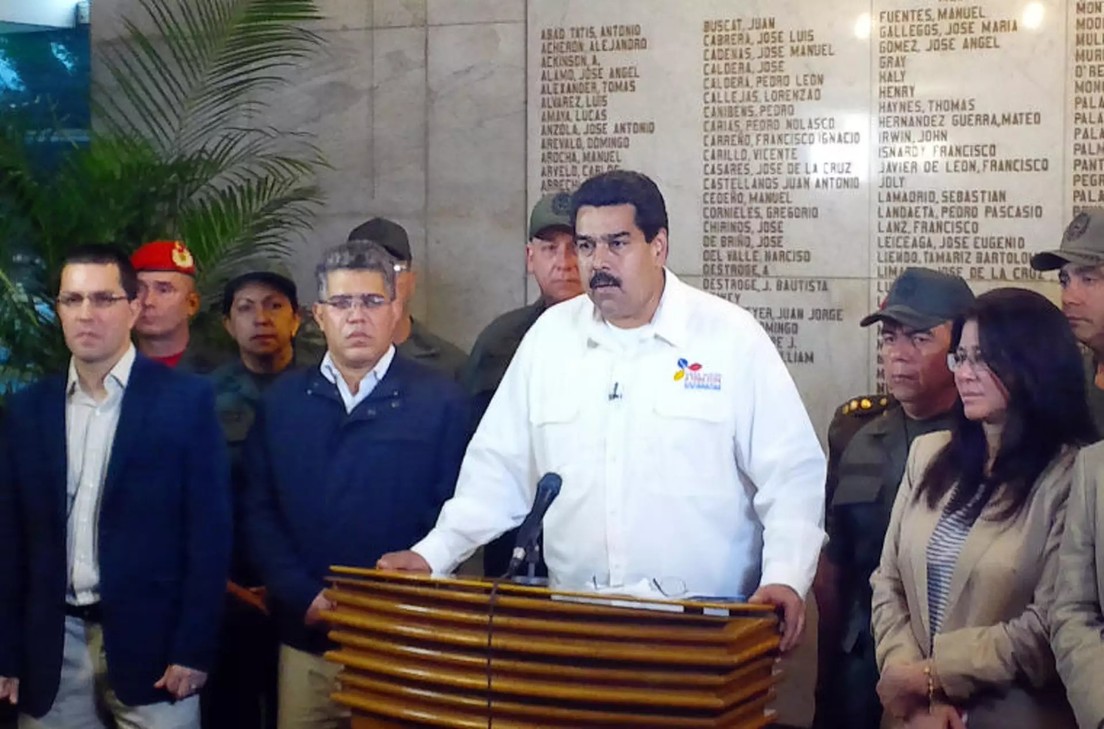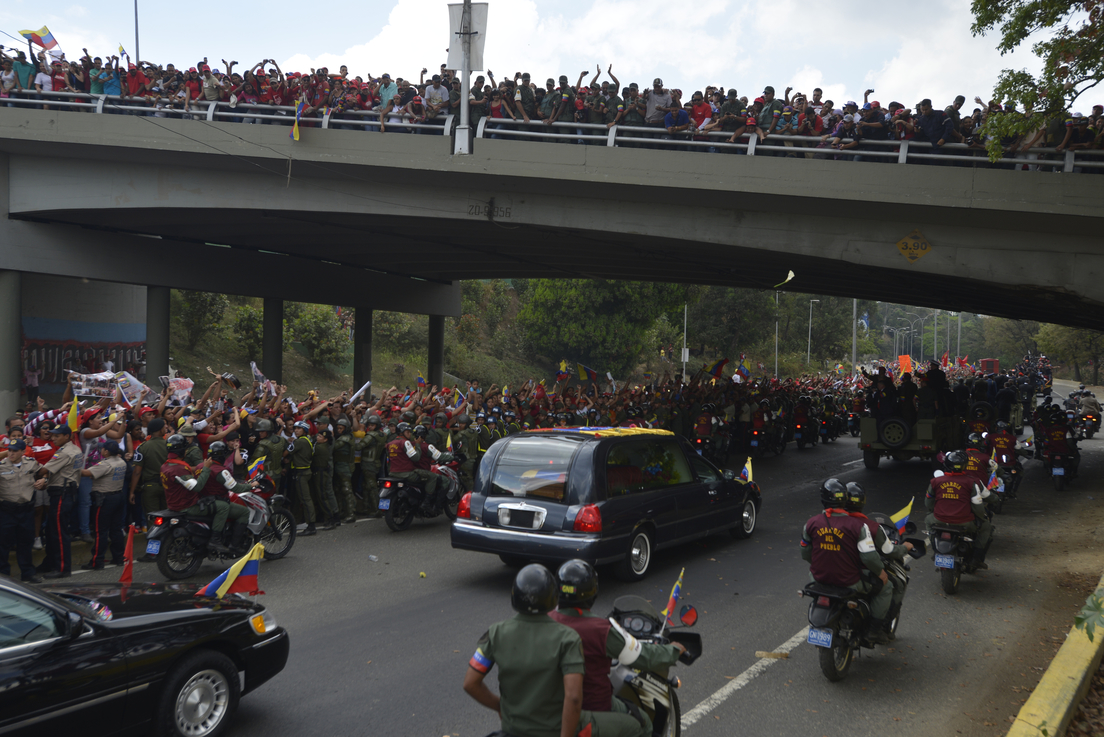
A person holds a photo of Hugo Chavez over a bridge overlooking a crowd of Chavistas who went to the streets of Caracas to bid a final goodbye to President Hugo Chávez on March 6, 2013. Photo: Ricardo Mazalan/AP.

Orinoco Tribune – News and opinion pieces about Venezuela and beyond
From Venezuela and made by Venezuelan Chavistas

A person holds a photo of Hugo Chavez over a bridge overlooking a crowd of Chavistas who went to the streets of Caracas to bid a final goodbye to President Hugo Chávez on March 6, 2013. Photo: Ricardo Mazalan/AP.
11 years after the passing of Hugo Chávez, RT spoke with people who shared their memories about how they mourned the leader of the Bolivarian Revolution after receiving the news of his death.
11 years have passed since the death of the then president of Venezuela, Hugo Chávez (1954-2013), and the pain over his departure is still present among many Venezuelans, who vividly remember those fateful moments that plunged the country into an unprecedented collective mourning, although for most, it started earlier, when it was announced that he had cancer.
His figure, still very present in public discourse, continues to shape the political, social, and cultural aspirations of Venezuela since the current Venezuelan State is, to a large extent, the result of the Bolivarian Revolution that he led for almost a decade and a half, synthesizing the most heartfelt—and long-awaited—demands of the people during the late 20th century and the early 21st century.
RT spoke with seven Venezuelans of different ages and professions, who lived through those days: the announcement of the disease, the epic campaign that gave Chávez a third presidential mandate, his death, and his political legacy. Everyone agrees that Chávez was a genuinely popular leader, whose transcendence surpassed his physical existence and his absence is very difficult to overcome.
The anguish begins
“When I found out that Chávez was sick, my reaction was one of anguish,” said Adria, a journalist who graduated from Misión Sucre, one of the social programs created by President Chávez to offer university degrees in poorer and remote areas. “I was very distressed, but at the same time I also appealed to my faith. I had a lot of faith that he could get out of that illness successfully because he was young, a robust man, strong. It never crossed my mind that Chávez was not going to be able to overcome this disease.”

Leonor, a teacher with extensive experience in community training, stated that her concern for the president’s well-being began the same day his illness was announced and, since then, she had the unpleasant feeling that it was something serious, although she wanted to do like the majority and believe the opposite, especially during the electoral campaign that gave Chávez a third term, when the ambience of hope reigned.
Leonor, like tens of thousands of Venezuelans, joined the route of the final day of the campaign: a mega march from Sabaneta, Chávez’s hometown in the Venezuelan plains, to the Miraflores Palace, the seat of the government, in Caracas. She caught up with him in Maracay, a city located about 40 kilometers from the capital.
By then, Leonor was about 55 years old and was already overweight, and had significant respiratory problems. Despite her physical limitations, she remembers “running as if she were a 15-year-old girl” and telling one of her friends, who joined the caravan with her, that she was taking advantage of seeing Chávez well because she had the intuition that it would be the last time. She was not wrong.
Adria and Leonor felt what José Gómez, a social psychologist interviewed by RT, identifies as the “denial of grief” that at that time was going through the entire country and made Chávez’s illness a taboo topic: he was discussed, but not his illness and not the possibility that he could lose the battle against cancer.
“In the office as such, there was no talk of the president’s illness. There was a total denial,” said Gómez, who in 2012 worked in the public sector and taught classes at the Central University of Venezuela. “When the president was talked about, nothing, he was just the president. But everyone saw when we saw him on television, when we watched him giving his speeches, I always felt a general concern for his health, that is, he was not taking care of himself and was giving everything.”
According to the specialist, there was another angle to the issue: no one talked about the illness, but many were worried about his fate and feared that the demanding presidential campaign, in which he embarked in order to guarantee the continuity of his political project, would end up undermining his already compromised state of health.
“It seems to me an extreme stupidity. He should have retired, he should have focused on his health, and then come back after that,” Gómez added. “In other words, the people were going to love him anyway, and he could come back again quietly. That we might lose the election? No, it wasn’t going to happen. He should have put someone else there, another person, and dedicated a little time to himself.”
More anguish
The end was approaching insidiously, but collective hope persisted. Not so for Leonor, who saw in the famous “Strike at the helm” speech given by Chávez a few days after his last victory at the polls, a political testament on core issues of the Bolivarian project that had been left behind for various reasons, but that needed to get going as soon as possible.
“When Chávez wins and proposes the Strike at the Helm, which was a few days later, I understand that Chávez knows that things are too serious and that we must put seriousness into some things that were postponed and that were not touched upon during the campaign, because well, for obvious reasons you couldn’t take away the wonderful climate of optimism that the communications wizard Jorge Rodríguez created. That campaign was his creation, I remember it perfectly well,” Leonor recalled.

Now with hindsight, Ritguey, an accountant in a private company, recounted that during the campaign “the president suffered with pain.” She mentioned another milestone in the collective mourning for Hugo Chávez: December 8, 2012, when he announced that he would go to Havana to have surgery again and named Nicolás Maduro as his eventual successor. “We were all in the midst of great stupor,” she recalled, adding that she received the bad news in the company of family and friends. Joyfulness turned into a sad atmosphere.
“From then on we were in expectation,” she continued. “The day the president returned to Caracas—in February 2013—I remember that I played ‘Chávez corazón del pueblo‘ [a very popular campaign song those days]. I was very happy. I thought that he was getting better, not that he was going to die. Then… a few days later some medical reports came in” along with more anguish.
Evaluna is 19 years old. She was only nine when Chávez died and, for her, he was an omnipresent figure. She clearly remembers the omnipresent unrest during the weeks before his death. “I remember a lot that the previous weeks had been very confusing because nothing was known about him,” she commented. “They had set up like a photo, but well, that is, everything that we knew, at least where I was studying, that Chávez was sick and they talked about that because I remember it.”
The worst news
Finally, the day that many feared arrived: Chávez’s death was announced. Emilio, a physicist and network administrator, said to RT that he was at the Bolivarian University (created by the then president to provide higher education opportunities to the millions of high school graduates without a university degree) with a friend when on national television, Maduro announced, “We have received the harshest and most tragic news that we can transmit to our people: at 4:25 in the afternoon, President Commander Hugo Chávez Frías passed away, after battling hard with an illness for almost two years.”

“It was expected news, well, in a way, that last day. But if they didn’t announce it, I would not have believed it, and there was going to be speculation,” Emilio commented.
Adria remembers that when she heard the news, a feeling of unreality and disorientation invaded her. She confesses that she felt so overwhelmed that she lost “the compass” and “direction,” and for a moment she did not know what to do. Finally, she went home and there she commented on what happened to his mother-in-law, and then joined, like hundreds of thousands of other people, the funeral caravan that transported the mortal remains of “the commander” from the Military Hospital to his alma mater, the Military Academy of Venezuela.
“I remember that I really got very sad, because I was always very close, going to marches, knowing about Chávez, being familiar with Chávez and the personality,” recalled Evaluna.
Caracas, a usually bustling city, fell into a dead silence and, in addition, there were many signs of solidarity and camaraderie, completely alien to its usual ferocity, where the law of whoever shouts the loudest usually prevails.
“How did we find the city? We found it completely packed, but completely silent, strangely silent,” Leonor described. “There were cars everywhere, but the people didn’t fight with those of us who were controling the traffic, nor did we fight among ourselves, nor did anyone. I didn’t say anything to anyone. It was like, well, if I was in the way, I moved to one side so that the other could pass and things like that.”
Ritguey called the situation at that time a state of collective shock. “It was a city, and I would say rather a country, coming out of the shock, as if trying to accept the situation and with that need to see with one’s own eyes,” she said. “That we had in front of us—in a coffin—our hero, our father, the director of this entire political project for which so many gave their youth, their lives. Years go by and I still think about that. I think about it with great sorrow.”

Chávez transcended Chávez
Although those fateful days remain fresh in the memories of many Venezuelans, Hugo Chávez transcended the plane of physical existence to become “an idea,” as Ritguey says.
“Chávez is the greatest hero of the country,” she said. “He is the toughest president the country has ever had, and also the most beloved. When Simón Bolívar died, many people did not love him; on the other hand, Chávez was loved by his people. It is a big difference: Chávez was able to govern, he gave us dignity, he gave us sovereignty, he gave us things that, despite all the efforts that many have made to take them away from us, people do not let go, there is something that continues to remain.”
Led by Hugo Chávez, the People Defeated the Neocolonial FTAA
Rogel Navas is a historian and university professor. In conversation with RT he synthesized some aspects of Hugo Chávez’s political legacy, both inside and outside Venezuela. He did not hesitate to point out Chávez’s insistence on “giving priority to elections to resolve the political contradictions of Venezuelan society,” a strategy that has been continued by his successor, Nicolás Maduro.
Navas also highlighted Chávez’s refoundation of the Venezuelan State in a model of five powers—Executive (government), Legislative, Judicial, Electoral, and Moral—in governmentality based on the civil-military alliance and in the numerous regional integration mechanisms that he pioneered, led and promoted, such as the Bolivarian Alliance for the Peoples of Our America (ALBA), the Union of South American Nations (UNASUR), and the Community of Latin American and Caribbean States (CELAC).
The week Chávez died, the United Nations General Assembly held a special session to honor his legacy. The then Secretary General Ban Ki-Moon recognized the president’s commitment to ensuring that “the most vulnerable” reached acceptable standards of living within the framework of the Millennium Development Goals, as well as his “decisive impulse” to the regional integration mechanisms “based on an eminently Latin American vision.”
“Chávez is an energy, he remains an energy,” emphasized Adria, one among millions of Venezuelans whom the leader of the Bolivarian Revolution gave dignity symbolically and materially. “Sometimes there is a radiant, strong, harsh sun, and overnight a drizzle appears, and we say: ‘Chávez is blessing the demonstration, the march.’ In that we always remember Chávez with a lot of love, with a lot of affection.”
(RT) by Zhandra Flores
Translation: Orinoco Tribune
OT/JRE/SC